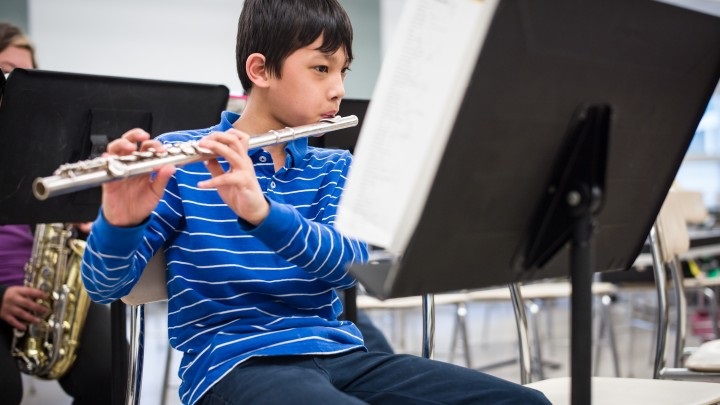The final notes of a school concert may fade, but the impact of a strong school music program resonates far beyond the classroom. The benefits of music education extend throughout a student’s life, fostering not just musical skills but essential qualities that contribute to success in all areas. Here’s how music appreciation for students translates into a lifelong love of learning and a foundation for a well-rounded life.
The Melody of Success: Lifelong Benefits of Music Education
- Cognitive Powerhouse: Music stimulates brain development, enhancing memory, attention span, and critical thinking skills – valuable assets not just in music but in all academic pursuits.
- Emotional Intelligence Champions: Music provides a healthy outlet for emotions and fosters self-expression. These skills translate into better emotional regulation, stronger communication abilities, and increased self-confidence.
- Collaboration and Teamwork: Ensemble work teaches valuable collaboration and teamwork skills. Students learn to listen to each other, contribute to a shared goal, and celebrate collective achievements – essential skills for success in any profession.
- Discipline and Perseverance: Learning an instrument or mastering a musical piece requires dedication and practice. Music education instills a love of lifelong learning and the perseverance needed to overcome challenges – a valuable trait for navigating the complexities of life.
- Creativity and Innovation: Music ignites creativity and encourages students to think outside the box. This problem-solving skill and ability to approach challenges from different angles is crucial in a world that demands innovation.
Beyond the Notes: A Journey of Lifelong Learning
Music education opens doors to a world of lifelong learning. Here’s how:
- Developing Musical Independence: Students who learn music gain the skills to explore music on their own. They can learn new instruments, delve into different musical styles, or even compose their own music. This fosters a love of independent learning that extends far beyond the music realm.
- Appreciation for Different Cultures: Music education broadens horizons and fosters appreciation for diverse cultures and traditions. By exploring music from around the world, students gain a deeper understanding of the world and develop a sense of global citizenship.
- The Joy of Self-Expression: Music provides a unique outlet for self-expression, regardless of age or skill level. Whether it’s singing along to a favorite song, playing an instrument for relaxation, or even joining a community choir later in life, music offers a way to connect with oneself and express emotions creatively.
Building a Legacy of Music Appreciation
Here’s how to cultivate a love of music appreciation in students:
- Exposure to Diverse Genres: Don’t limit students to classical music! Expose them to a variety of musical styles, from pop and rock to jazz and world music. This broadens their musical horizons and helps them discover music they connect with on a personal level.
- Active Listening: Move beyond passive listening. Encourage students to listen attentively to music, analyze different elements like melody, rhythm, and harmony, and discuss the emotions the music evokes.
- Connecting Music to Life: Help students connect music to their lives. Explore how music is used in movies, TV shows, and video games. Discuss the role of music in different cultures and historical periods.
The Final Encore: A Symphony of Well-Rounded Individuals
Investing in school music programs is an investment in the future. Music education equips students with the skills, confidence, and creativity to thrive in a complex world. It fosters a lifelong love of learning, a deeper appreciation for the arts, and the ability to connect with others through the universal language of music. Let the music keep playing, and witness the beautiful legacy of a well-rounded education unfold.

